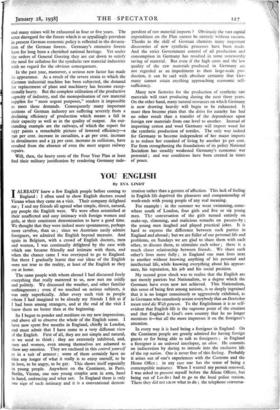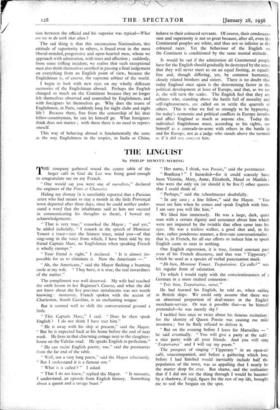YOU ENGLISH
By EVA LINDT
IALREADY knew a few English people before coming to England : I often used to show English doctors round Vienna when they came on a visit. Their company delighted me ; I and my friends all agreed what simple, direct, natural, gay people the English were. We were often astonished at their unaffected and easy intimacy with foreign women and girls, at their consistent determination to have a good time. We thought that they were indeed more spontaneous, perhaps more carefree, than us ; since we Austrians easily admire foreigners, we admired the English beyond measure. And again in Belgium, with a crowd of English doctors, men and women, I was continually delighted by the ease with which one became friendly and intimate with them, and when the chance came I was overjoyed to go to England. But there I gradually learnt that our ideas of the English were not true to the reality, at least of the English as they are at home.
The same people with whom abroad I had discussed freely everything that really mattered to us, now met me coldly and politely. We discussed the weather, and other familiar nothingnesses ; even if we touched on serious subjects, it was only superficially. After every such visit to people whom I had imagined to be already my friends I felt as if I had been among strangers, and at the end of the visit I knew them no better than at the beginning.
So I began to ponder and meditate on my new impressions, and above all to observe the whole of the English scene. I have now spent five months in England, chiefly in London, and must admit that I have come to a very different view of the English. First of all, they are not simple and natural, as we used to think ; they are extremely inhibited, and, men and women, even among themselves are ashamed to show any emotion. They are enclosed in this control yourself as in a suit of armour ; some of them certainly have no idea any longer of what it really is to enjoy oneself, to be in love, to be angry, to be gay. This shows itself especially in young people. Anywhere on the Continent, in Paris, Berlin, Vienna, one sees young couples arm in arm, hand in hand, embracing and what not. In England there is only one sign of such intimacy and it is a conventional demon- stration rather than a gesture of affection. This lack of feeling in English life deprived the pleasures and companionship of week-ends with young people of any real meaning.
For example : in the summer we went swimming, some- where south of London, four girls and five or six young men. The conversation of the girls turned entirely on make-up, slimming, and malicious remarks on passers-by ; the young men laughed and played practical jokes. It is hard to express the difference between such parties in England and abroad ; but we are fuller of our personal life and problems, on Sundays we are glad to share them with each other, to discuss them, to stimulate each other ; there is a much closer relationship between friends. We share each other's lives more fully ; in England one man lives next to another without knowing anything of his personal and intellectual life, while knowing everything about his appear- ance, his reputation, his job and his social position.
My second great shock was to realise that the English are not merely patriots but Nationalists, to a degree which the Germans have even now not achieved. This Nationalism, this sense of being first among nations, is so deeply ingrained that it is no longer consciously or aggressively exhibited, as in Germans who ceaselessly assure everybody that an Deutsche?: wesen wird die Welt genesen. To the Englishman it is so self- evident that English life is the supreme point of the creation and that England is God's own country that he no longer mentions it—but all the more impresses it on the foreigner's attention.
In every way it is hard being a foreigner in England. On the Continent people are greatly admired for having foreign guests or for being able to talk to foreigners ; in England a foreigner is an unloved interloper, an alien. He commits an indiscretion by daring to intrude into the exclusive life of the top nation. One is never free of this feeling. Probably it arises out of one's experiences with the Customs and the Home Office ; in any case one has the sense of being a contemptible nuisance. When I wanted my permit renewed, I was asked to present myself before the Aliens Officer, but being out of Lor do .1 had to go to the local police station. There they did not bn 3W what to do ; the telephone conversa- tion between the official and his superior was typical—What are we to do with that alien ?
The sad thing is that this unconscious Nationalism, this attitude of superiority to others, is found even in the most liberal-minded, progressive and open-hearted men, whom we approach with admiration, with trust and affection ; suddenly, from some trifling incident, we realise that such exceptional men also think themselves justified in passing a final judgement on everything from an English point of view, because the Englishman is, of course, the supreme arbiter of the world.
I begin to look with new eyes on my wholly different memories of the Englishman abroad. Perhaps the English changed so much on the Continent because they no longer felt themselves observed and controlled by Englishmen, and with foreigners let themselves go. Why does the truest of Englishmen, in Paris, suddenly long for night clubs and night life ? Because there, free from the censorship of his dear fellow-countrymen, he can let himself go. What foreigners think does not matter ; with them there is no need to repress oneself.
This way of behaving abroad is fundamentally the same as the way Englishmen in the tropics, in India or China, behave to their coloured servants. Of course, their condescen- sion and superiority is not so great because, after all, even the Continental peoples are white, and thus not so inferior as the coloured races. Yet the behaviour of the English on the Continent is conditioned by the same mental attitude.
It would be sad if the admiration all Continental people have for the English should gradually be destroyed by the sense that they will never meet us on an equal footing, as equally free and, though differing, yet, by common humanity, closely related brothers and sisters. There is no doubt that today England once again is the determining factor in the political development at least of Europe, and that, as we see it, she will turn the scales. The English feel that they are arbiters who, standing above the battle full of morality and self-righteousness, arc called on to settle the quarrels of others. This is what we feel so strongly to be hypocrisy, for today's economic and political conflicts in Europe involve and affect England as much as anyone else. Today the individual Englishman must, according to his rights, see himself as a comrade-in-arms with others in the battle in and for Europe, not as a judge who stands above the turmoil as if it did not cono:rn him.



















































 Previous page
Previous page